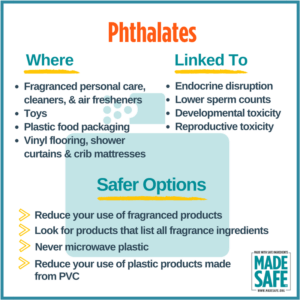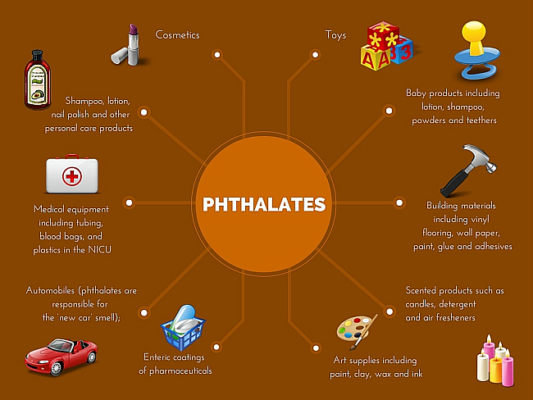What are phthalates, and how do they put our health at risk?
 Phthalates are a group of chemicals used to make plastics more durable. They are often called plasticizers. Some phthalates are used to help dissolve other materials. Phthalates are in hundreds of products, such as vinyl flooring, lubricating oils, and personal-care products (soaps, shampoos, hair sprays).
Some phthalates are in polyvinyl chloride plastics, which are used to make products such as plastic packaging, garden hoses, and medical tubing.
Ortho-phthalates, commonly referred to as phthalates, are synthetic chemicals that are used to manufacture plastic. They help make plastic more flexible and harder to break.
Despite their abundance in many products, phthalates can be harmful to pregnant women and their children. These chemicals can disrupt the endocrine system, the glands that release hormones as the body’s chemical messengers. Studies suggest that can lead to pregnant women delivering their babies early. Other studies have found that children born to mothers exposed to high levels of phthalates can have a lower IQ and poorer social communication development, and that these children are also more likely to develop ADHD and behavior problems. Researchers have also found effects on the genital development of male infants born to mothers exposed to phthalates during pregnancy.
While phthalates can be found in nearly everyone, minority women have been found to be especially burdened. Studies show that many beauty products targeted at these communities contain high levels of chemicals.
Infants and young children may experience high phthalate levels because they often put plastic products in their mouths as they explore the world.
Phthalates can enter food at many places in the supply chain, including through plastic tubing for liquids during production, plastic storage containers and even food preparation gloves. Foods that are high in fat in particular can absorb phthalates through exposure during processing.
In personal care items, they're used to help lubricate other substances, help lotions penetrate and soften the skin, and help fragrances last longer. They're also used in toys, electronics (such as personal computers), car-care products, insecticides, and many household products, including adhesives, plastic wrap, plastic containers, flooring, furniture, wallpaper, shower curtains, and other things made of vinyl or PVC.
Phthalates are a group of chemicals used to make plastics more durable. They are often called plasticizers. Some phthalates are used to help dissolve other materials. Phthalates are in hundreds of products, such as vinyl flooring, lubricating oils, and personal-care products (soaps, shampoos, hair sprays).
Some phthalates are in polyvinyl chloride plastics, which are used to make products such as plastic packaging, garden hoses, and medical tubing.
Ortho-phthalates, commonly referred to as phthalates, are synthetic chemicals that are used to manufacture plastic. They help make plastic more flexible and harder to break.
Despite their abundance in many products, phthalates can be harmful to pregnant women and their children. These chemicals can disrupt the endocrine system, the glands that release hormones as the body’s chemical messengers. Studies suggest that can lead to pregnant women delivering their babies early. Other studies have found that children born to mothers exposed to high levels of phthalates can have a lower IQ and poorer social communication development, and that these children are also more likely to develop ADHD and behavior problems. Researchers have also found effects on the genital development of male infants born to mothers exposed to phthalates during pregnancy.
While phthalates can be found in nearly everyone, minority women have been found to be especially burdened. Studies show that many beauty products targeted at these communities contain high levels of chemicals.
Infants and young children may experience high phthalate levels because they often put plastic products in their mouths as they explore the world.
Phthalates can enter food at many places in the supply chain, including through plastic tubing for liquids during production, plastic storage containers and even food preparation gloves. Foods that are high in fat in particular can absorb phthalates through exposure during processing.
In personal care items, they're used to help lubricate other substances, help lotions penetrate and soften the skin, and help fragrances last longer. They're also used in toys, electronics (such as personal computers), car-care products, insecticides, and many household products, including adhesives, plastic wrap, plastic containers, flooring, furniture, wallpaper, shower curtains, and other things made of vinyl or PVC.

Next
previous
 Phthalates are a group of chemicals used to make plastics more durable. They are often called plasticizers. Some phthalates are used to help dissolve other materials. Phthalates are in hundreds of products, such as vinyl flooring, lubricating oils, and personal-care products (soaps, shampoos, hair sprays).
Some phthalates are in polyvinyl chloride plastics, which are used to make products such as plastic packaging, garden hoses, and medical tubing.
Ortho-phthalates, commonly referred to as phthalates, are synthetic chemicals that are used to manufacture plastic. They help make plastic more flexible and harder to break.
Despite their abundance in many products, phthalates can be harmful to pregnant women and their children. These chemicals can disrupt the endocrine system, the glands that release hormones as the body’s chemical messengers. Studies suggest that can lead to pregnant women delivering their babies early. Other studies have found that children born to mothers exposed to high levels of phthalates can have a lower IQ and poorer social communication development, and that these children are also more likely to develop ADHD and behavior problems. Researchers have also found effects on the genital development of male infants born to mothers exposed to phthalates during pregnancy.
While phthalates can be found in nearly everyone, minority women have been found to be especially burdened. Studies show that many beauty products targeted at these communities contain high levels of chemicals.
Infants and young children may experience high phthalate levels because they often put plastic products in their mouths as they explore the world.
Phthalates can enter food at many places in the supply chain, including through plastic tubing for liquids during production, plastic storage containers and even food preparation gloves. Foods that are high in fat in particular can absorb phthalates through exposure during processing.
In personal care items, they're used to help lubricate other substances, help lotions penetrate and soften the skin, and help fragrances last longer. They're also used in toys, electronics (such as personal computers), car-care products, insecticides, and many household products, including adhesives, plastic wrap, plastic containers, flooring, furniture, wallpaper, shower curtains, and other things made of vinyl or PVC.
Phthalates are a group of chemicals used to make plastics more durable. They are often called plasticizers. Some phthalates are used to help dissolve other materials. Phthalates are in hundreds of products, such as vinyl flooring, lubricating oils, and personal-care products (soaps, shampoos, hair sprays).
Some phthalates are in polyvinyl chloride plastics, which are used to make products such as plastic packaging, garden hoses, and medical tubing.
Ortho-phthalates, commonly referred to as phthalates, are synthetic chemicals that are used to manufacture plastic. They help make plastic more flexible and harder to break.
Despite their abundance in many products, phthalates can be harmful to pregnant women and their children. These chemicals can disrupt the endocrine system, the glands that release hormones as the body’s chemical messengers. Studies suggest that can lead to pregnant women delivering their babies early. Other studies have found that children born to mothers exposed to high levels of phthalates can have a lower IQ and poorer social communication development, and that these children are also more likely to develop ADHD and behavior problems. Researchers have also found effects on the genital development of male infants born to mothers exposed to phthalates during pregnancy.
While phthalates can be found in nearly everyone, minority women have been found to be especially burdened. Studies show that many beauty products targeted at these communities contain high levels of chemicals.
Infants and young children may experience high phthalate levels because they often put plastic products in their mouths as they explore the world.
Phthalates can enter food at many places in the supply chain, including through plastic tubing for liquids during production, plastic storage containers and even food preparation gloves. Foods that are high in fat in particular can absorb phthalates through exposure during processing.
In personal care items, they're used to help lubricate other substances, help lotions penetrate and soften the skin, and help fragrances last longer. They're also used in toys, electronics (such as personal computers), car-care products, insecticides, and many household products, including adhesives, plastic wrap, plastic containers, flooring, furniture, wallpaper, shower curtains, and other things made of vinyl or PVC.










 Latest News
Latest News
 General Studies
General Studies